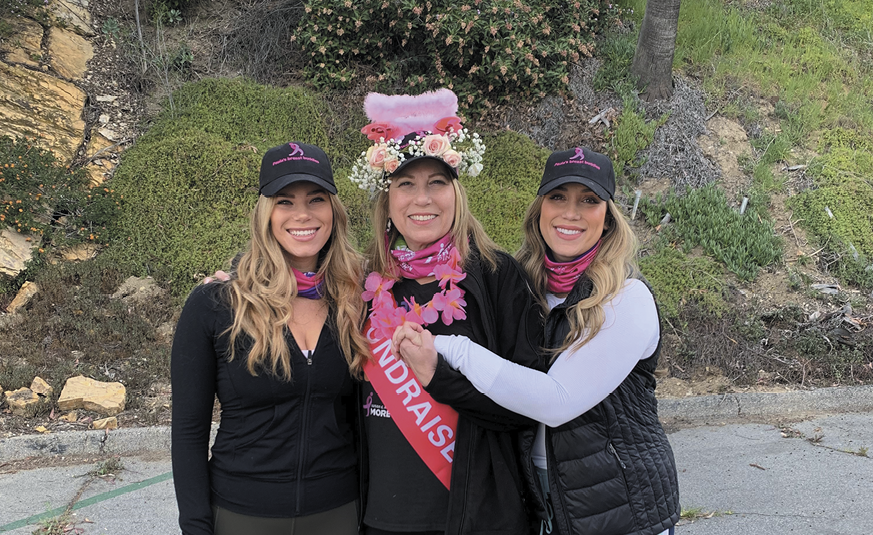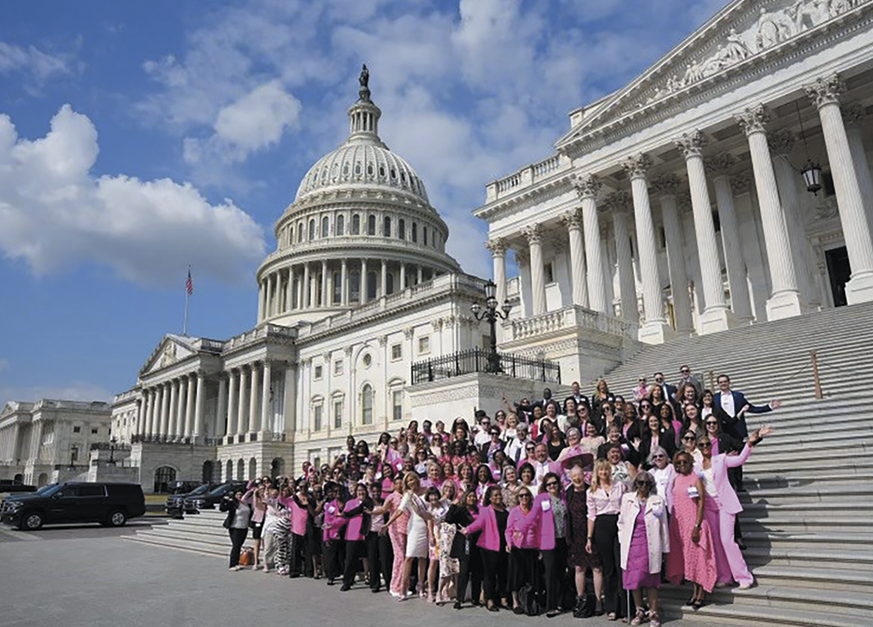- Home
- Media Kit
- MediaJet
- Current Issue
- Past Issues
- Ad Specs-Submission
- Reprints (PDF)
- Photo Specifications (PDF)
- Contact Us
- PRIVACY POLICY
- TERMS OF USE
![]()
ONLINE
![]()
ONLINE

Searching For Tomorrow’s Cures
Editors’ Note
As President and Chief Executive Officer of Susan G. Komen, Paula Schneider is responsible for the day-to-day operations and strategic direction of the world’s largest breast cancer organization. As a breast cancer survivor, and having lost her mother to metastatic breast cancer, Schneider’s work is personal as she brings a unique combination of business expertise and real-world perspective to Komen’s mission as CEO. During her tenure, Schneider led Komen through an enterprise-wide restructuring, transforming Komen’s national network of independent local affiliate organizations into a single, united entity, leveraging shared operational functions while maintaining local development and mission teams across the country. Schneider is a sought-after public speaker on impactful leadership and women’s health. She has been a featured speaker at such thought leadership events as Fortune’s Most Powerful Women, Yahoo! Finance, Women in Retail, Milken Institute and Dreamforce. She is currently a member and keynote speaker of C200, the preeminent global organization for the advancement of women business leaders. Schneider also serves on the Bloomberg New Economy Forum’s International Cancer Coalition and is a member of Fast Company’s Impact Council. She is widely regarded as a business expert in organizational management and finance. Prior to Komen, she served as CEO of American Apparel, which was the largest vertically integrated clothing manufacturer in the U.S. with over 8,500 employees and 600 retail stores internationally. She previously served as president of the Warnaco Swimwear Group, the largest swimwear company in the world, with brands such as Speedo and Calvin Klein. Subsequently, Schneider became a senior advisor at the private equity firm, The Gores Group, where she created platform strategies for best-in-class operations and potential acquisitions. She became the first female CEO in The Gores Group’s portfolio of companies. Schneider is a graduate of California State University, Chico.
Organization Brief
Founded in 1982 with $200 and a shoebox full of potential donor names, Susan G. Komen (komen.org) has now grown into the world’s largest nonprofit source of funding for the fight against breast cancer. Susan G. Komen is the only organization addressing breast cancer using a comprehensive 360-degree approach which spans groundbreaking research, community health outreach, issue advocacy, and programming. To date, Susan G. Komen has invested nearly $3.6 billion across 60 countries.

Paula Schneider, joined by her two daughters at a Komen event,
attributes her family’s deep history of cancer to her
personal fight to end the disease
What led to your interest in leading Susan G. Komen and made you feel it was the right fit?
My journey towards leading Komen was deeply personal. I like to say the choice was made for me. During my years in the private sector, I was diagnosed with triple-negative breast cancer, one of the deadliest forms of this disease. I discovered it myself and spent time undergoing chemo treatments, a mastectomy, and radiation, all while I was leading Warnaco.
Unfortunately, this wasn’t my first brush with cancer: my mother died of metastatic breast cancer, my brother died of metastatic prostate cancer, my sister had melanoma and then, I faced my own breast cancer diagnosis. When the opportunity to lead Komen came to me, I had no choice. I was already using my voice and platform to raise awareness and funds for the disease, but I knew I wanted to make an even bigger impact so my daughters and the generations after had a chance of living in a world without breast cancer. The opportunity to lead Komen was the perfect convergence of my personal mission and professional expertise.
How has your background and experience as CEO of private sector companies helped in your role leading Susan G. Komen?
My experience as CEO of private sector companies has brought me some of the toughest leadership projects, including navigating incredibly difficult turnarounds, cash flow analyses, total cultural overhauls and, of course, overseeing thousands of personnel.
When I became CEO of Komen, I felt a new urgency in the nonprofit arena – especially with an issue as widespread and timely as breast cancer. A big part of my job leading Komen is conducting a public “turnaround” in the way we all view breast cancer. It requires fiscal management, data-driven decision-making, and large-scale cultural mindset shifts – all of which I first learned how to execute in the private sector.

Komen hosts its annual Advocacy Summit every summer where
advocates and survivors meet with congressmen and women
to protect patient rights
How do you define Susan G. Komen’s mission and purpose?
Our mission is simple yet profound: to save lives by meeting the most critical needs in our communities and investing in breakthrough research to prevent and cure breast cancer.
In the United States alone, 1 in 8 women will be diagnosed with breast cancer in their lifetime. It is a pervasive, indiscriminate disease and this statistic serves as a powerful reminder of the relentless enemy we are up against.
We aim to support those affected by breast cancer today while tirelessly searching for tomorrow’s cures. Through our comprehensive approach – which encompasses over $1 billion dollars in research, community health, patient care, and public policy advocacy – we strive to ensure that all those facing breast cancer feel supported, informed, and empowered. We embed ourselves directly within the communities that we support, help patients navigate the diagnosis and treatment, provide financial assistance, and more. It is truly a 360-degree approach to care.
What have been the keys to Susan G. Komen’s leadership and how do you describe the Susan G. Komen difference?
The keys to Komen’s leadership are our relentless pursuit of our mission, our commitment to science and evidence-based solutions, and our deep connection to the community. The “Susan G. Komen difference” lies in our holistic approach to fighting breast cancer.
We are not just funding research; we are on the ground, providing direct support to those in need, advocating for patient rights, and working to ensure that everyone has access to quality care. This comprehensive, multi-faceted strategy sets us apart and amplifies our impact.
Will you discuss Susan G. Komen’s focus and commitment to research?
Research is the cornerstone of our mission at Susan G. Komen – it is how we continue edging closer to lifesaving breakthroughs. We have invested over $1 billion in research since our inception, making us the largest nonprofit funder of breast cancer research outside of the U.S. government.
Our focus spans early detection and treatment strategies to understanding metastatic disease and developing new therapies. By investing in the brightest minds and most innovative projects, we aim to accelerate scientific progress and bring us closer to a world without breast cancer. While research may not be as flashy to some, it is quietly saving lives every day.
The progress we’ve made over the years is nothing short of incredible. Thanks to countless discoveries and investments backed by our donors, Komen has helped reduce the breast cancer mortality rate by 42 percent since 1989 – a testament to the power of research, advocacy, and community support.
Will you highlight Susan G. Komen’s efforts in promoting community health?
In terms of promoting community health, we know that you can’t just force yourself into a neighborhood and start creating change – especially in the public health space. That is why we spend critical on-the-ground time in our markets, making sure our efforts are publicized, and working with key stakeholders to help build healthy communities.
Our community health programs are designed to educate, screen, and connect individuals with the care they need, particularly in underserved populations. This work is critical because it translates our research findings into tangible benefits for those affected by breast cancer, ensuring that advancements in care are accessible to all.
How critical is innovation to Susan G. Komen’s culture and mission?
Innovation is at the heart of everything we do. We are pioneering efforts in digital health to improve patient care and outcomes, developing advanced genetic screening tools to personalize treatment plans, and leveraging artificial intelligence to enhance diagnostic accuracy. This culture of innovation is what enables us to stay at the forefront of the fight against breast cancer, transforming the landscape of research and care.
Our ShareForCures initiative is emblematic of our innovative streak. ShareForCures is a secure breast cancer research registry that connects researchers with the information of people who have or had breast cancer. The benefits of this registry are twofold: it makes it easier for more people with breast cancer to confidentially contribute to research about this disease, and it allows researchers access to a broader set of diverse data. The more data we can collect, the faster we can spur innovative scientific breakthroughs.
What do you feel are the keys to effective leadership?
Effective leadership, to me, is characterized by vision, empathy, and resilience. It’s about setting a clear direction, inspiring your team to embrace that vision, and navigating challenges with grace and determination. It’s also about humility and trust – having the humility to know you aren’t an expert in everything, and hiring the best people who you can trust with your business. Having a personal connection to your cause also certainly doesn’t hurt.
What advice do you offer to young people beginning their careers?
My advice to young people starting their careers is to pursue your passions with openness and curiosity. Don’t be afraid to take calculated risks and step outside your comfort zone. Growth, in my experience, is borne from the times we feel the least comfortable and most tested.
A good reminder is that the path to fulfillment is not always linear. Be patient with yourself and stay adaptable to the ever-changing landscape of life. And always remember, no matter your focus, you’re continuously developing transferable skills in your career that allow you to pivot and take on exciting new roles and industries. I surely wouldn’t have guessed 20 years ago that I would leave fashion for fundraising, but life has a way of guiding you to your ultimate purpose. Above all, stay true to your values and vision, as they will anchor you through the ups and downs of your professional journey.![]()